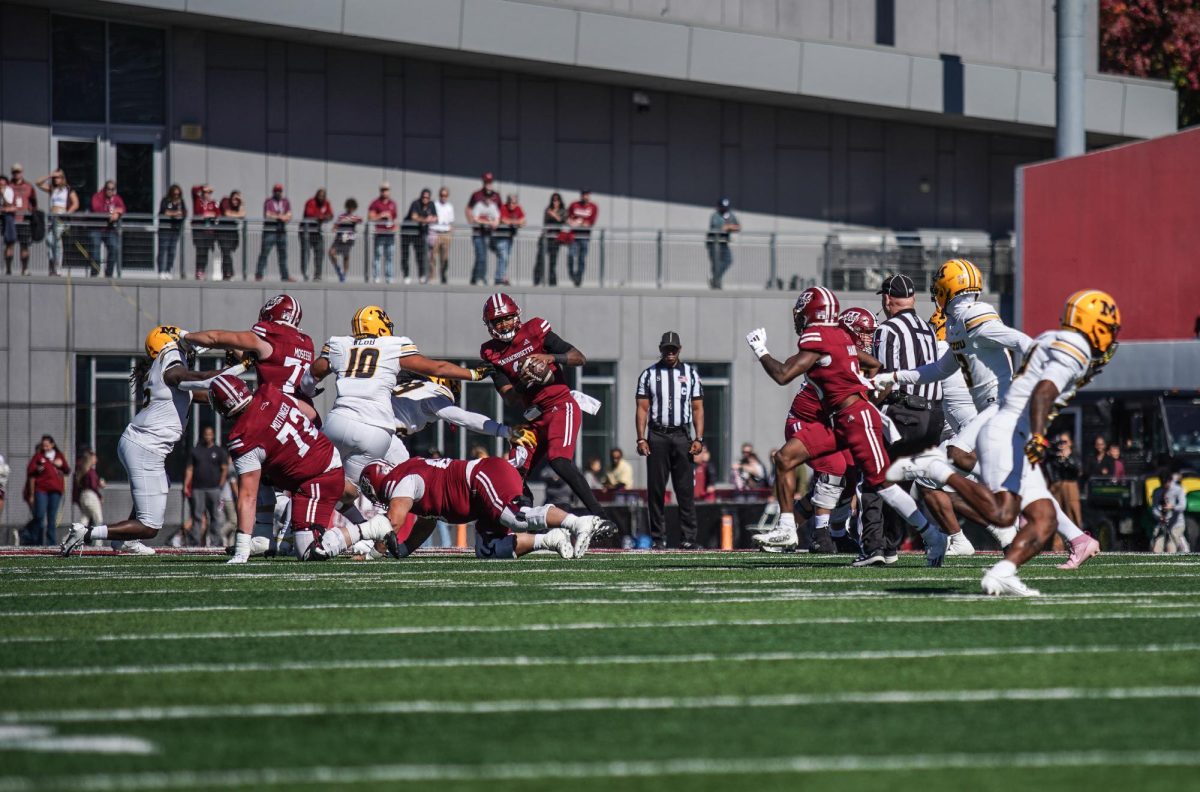
The recent trend of artists choosing to bypass the record industry in order to get their music out to fans has began to include some big names, including: Jack White’s Raconteurs, Gnarls Barkley, Nine Inch Nails, and Radiohead, who first received major press for their involvement of industry-defying tactics to get their record to their fans back in October.
An underground warrior of this phenomenon is Saul Williams, who will make a stop in Northampton on his “Tar Spangled Banner” tour this Thursday with Dragons of Zynth. The tour, which began in mid-February supports Williams’ most recent record “The Inevitable Rise and Liberation of Niggy Tardust,” which was released in late 2007.
Williams is a renaissance man of sorts, finding success in a number of art forms. After receiving his B.A. in philosophy from Morehouse College in Atlanta and his Master’s in acting from NYU, Williams was named the Nuyorican Poets Caf’eacute; “Grand Slam Champion,” evidence of his proficiency in spoken word and beat poetry. In 1998 he starred in “Slam,” which won the Grand Jury Prize at that year’s Sundance film festival and got Williams’ name out to the masses.
In 2001, with the help of producer Rick Rubin, Williams released his first full-length record, “Amethyst Rock Star” (also pronounced “Am I This Rock Star”), delving into hip-hop sensibilities. Rubin’s apocalyptic sound underscores Williams’ aggressive delivery in the manner of a street preacher seized by the ills brought onto society by brand-name consumerism and greed. The track “Robeson” reads as a retelling of a surreal, symbolic dream, while “Om Nia Merican” finds Williams sticking to a delivery with actual song structure over a Rage Against the Machine sample.
Williams released his self titled full-length in 2004, another startling social commentary keying in on such constructs as the MTV music video culture, racial roles, and fame. Musically, a more violent approach was taken to mirror Williams’ militant diction, employing heavy guitar riffs that preceded the industrial overtones of his most recent record. A certain Rage Against the Machine lust from Williams’ first album appears again, as Zack de la Rocha’s unmistakable vocal penetrates the track “Act III Scene 2 (Shakespeare),” which de la Rocha co-wrote.
After this apparent breakthrough, Williams got the attention of Trent Reznor and his band Nine Inch Nails, with whom he toured in 2005. Williams also appeared on Nine Inch Nails’ 2007 record “Year Zero” after touring with them again in 2006. This relationship paved the way for Reznor’s interest in producing “The Inevitable Rise and Liberation of Niggy Tardust.”
Reznor’s production becomes quite apparent to anyone at all familiar with his previous work, capturing Williams’ unique style within the confines of an almost completely industrial-sounding record. The hip-hop notions still persist, though buried deep within Reznor’s signature style of building substantial layers on top of each other.
The album’s first single happens to be a cover of the U2 classic “Sunday Bloody Sunday,” staying true to the original song while displaying signature Williams quirks. The album’s suggestive third track “Tr(n)igger” uses an easily identifiable Public Enemy sample as its outline under Williams’ vocal. Most of the album’s lyrics are drawn from his 2006 collection of poetry “The Dead Emcee Scrolls: The Lost Teachings of Hip-Hop.”
The new record was released, with the help of Reznor and media distribution company Musicane, as a free digital download on Nov. 1, 2007, with the option of paying $5.00 to support the artist. This choice came a mere month after the perennially acclaimed Radiohead chose to alert the public that the band would be making their new record “In Rainbows” available initially as a digital download on Oct. 10, 2007, allowing one to name their own price for the MP3s, including a free option.
Radiohead announced this marketing decision ten days before the highly anticipated release was actually available, essentially leaking their own album. Reznor later also explored this venture with his own band, releasing the all instrumental “Ghosts I-IV” on March 2 with no previous information on the record available to the public.
While Radiohead didn’t necessarily have to worry about making money from this record (the legions of their fans instantly ate “In Rainbows” up), this route being taken by Williams came as a bit of a surprise, though, according to digg.com, of the over 150,000 digital downloads of the album as of January 2nd, nearly 29,000 included the $5.00 artist support option. This number dwarfs sales of Williams’ previous record, which has only sold about 30,000 copies. A physical release of the record is pending, apparently with 7 extra tracks.
Williams and Reznor are key players in this new era of bypassing physical record releases, no longer relying on the record industry to act as a medium through which music must pass from artist to audience. Though the option currently seems feasible only to big name artists and those they support, this rift in the industry will potentially alter record companies as a whole, obliterating what the record industry is used to and creating a new digitally-fueled, direct artist-to-audience paradigm.
Saul Williams with Dragons of Zynth will perform at the Iron Horse Music Hall Saturday April 12. The Iron Horse is located at 20 Center Street in Norhampton. The show is scheduled to start at 10 p.m., with general admission tickets $15 in advance and $18 at the door.
Ian Nelson can be reached at [email protected]






